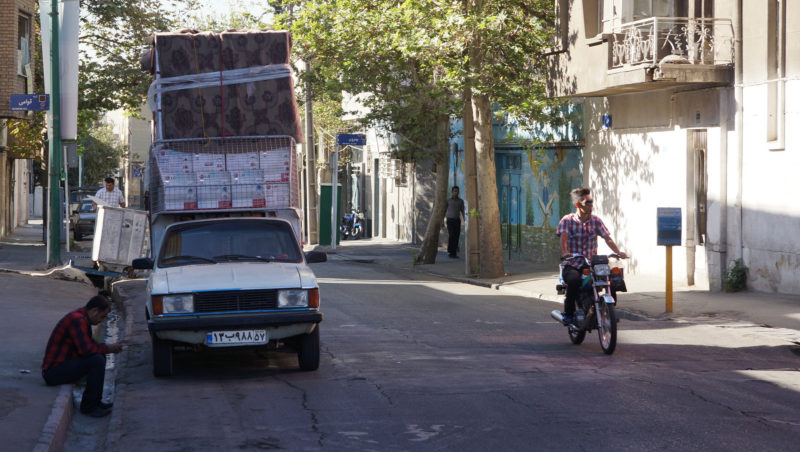Art and life are mirrors that stand tall and wide opposite each other, and it is impossible to say which reflects into which. In Iranian director Asghar Farhadi’s Oscar-winning film The Salesman, the story of disintegrating trust in a marriage set against a performance of Arthur Miller’s Death of a Salesman, the slippages between fiction and fact, theater and reality, are expressed with poignant clarity.
Farhadi, as in his other films—About Elly (2009), A Separation (2011), and The Past (2013)—is a master of cinematic metaphor alongside domestic drama, and The Salesman is by far one of his most engaging, suspenseful, and evocative works yet. From the very start, we are skillfully placed inside a world within a world: that of husband and wife actors, Emad (Shahab Hosseini) and Rana (Taraneh Alidoosti), and that of the characters they play on stage, Willy and Linda, the protagonists of Death of a Salesman. Both worlds sit heavily on thin ice.
The movie begins with a late-night evacuation of the apartment building where Emad and Rana live. The walls and ceilings are splintering, the glass in the windows is cracking, and there is imminent danger of the building collapsing on their heads. As Emad urges his wife to leave quickly, he goes back into the building to help a neighbor’s disabled son—a heroic act that firmly establishes his character as selfless and good. This characterization is reinforced by his job as a dedicated, liberal literature teacher. However, when a male intruder surprises Rana in the shower of their new apartment, Emad’s goodness starts to erode, giving way to doubt, shame, and rage fueled not only by social norms but also by Rana’s unwillingness to file a police report or be forthcoming about what actually happened. Thus the ice begins to crack.
Farhadi’s suspenseful cinematic storytelling is reminiscent of Alfred Hitchcock’s North by Northwest, in which the first image on screen is the world reflected in the distorted glass of a skyscraper, portending that nothing is as it seems. Likewise, in The Salesman, Farhadi builds interconnected worlds in which we are steered away from the whole truth until we come to see there is no such thing as a whole truth; that there are, at best, only half-truths compromised and reconstructed by circumstance. After all, what is the value of truth when a woman as liberal as Rana fears the humiliating consequences of accusing a man of personal violation? What is the shape of truth when we pity the antagonist and resent the hero? In “Death of a Salesman,” Willy commits suicide so that his son gets his insurance money to build a new life. Yet is Willy a hero? Or is his “selfless” act dishonorable? Is Willy as good a man as Emad, or are they both villains? Farhadi’s film invites us to dwell on these questions.
In the final scene, Emad stands behind the cracked glass of a window inside the very building he and Rana fled at the start of the film. It is a powerful image, and it is hard, in the context of our own political reality, not to read it as apt: a jolt towards the realization that we too stand next to Emad, inside a structure that may fall apart. The mirror of reality and the mirror of art reflect into each other, and we understand that like Emad, we have played a part in the destruction that has occurred, and that which is yet to come.
After President Trump signed his ill-fated executive order last month barring refugees and travelers from seven predominantly Muslim countries—Iran, Iraq, Sudan, Libya, Somalia, Syria and Yemen—Tehran-based Farhadi announced he would not be attending the Oscars on February 26th. In solidarity with those affected by the ban, Farhadi said he would not enter the US even if he were offered an exemption. Instead, London’s mayor, Sadiq Khan, transformed the city’s Trafalgar Square into an open-air cinema for the first UK showing of The Salesman on the same evening the Academy Awards were handed out. Hundreds were in attendance.

